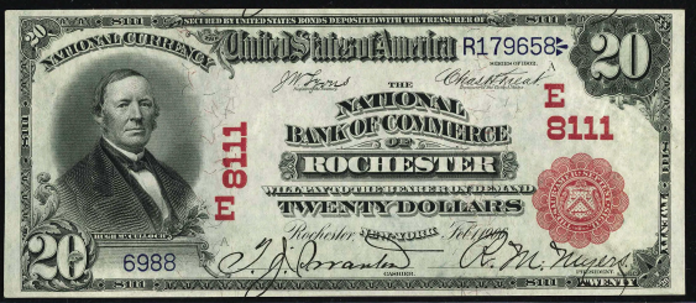Twenty Dollar Notes › Nationals › 1902 Twenty Dollar National Bank Notes › Texas Charters › 1902 $20 Channing Texas First National Bank
Get Value Now
| Item | Info |
|---|---|
| Series | 1902 |
| Charter | #10949 First National Bank of Channing, Texas |
| Year Chartered | 1917, 194 Banks Chartered |
| City Info | Channing is a city in Hartley County, Texas, in the United States. It is the county seat of Hartley County. As of the 2010 census, the city population was 363. Channing was founded in 1888 by George Channing Rivers, a paymaster for the Fort Worth and Denver City Railway. The settlement was originally called Rivers. Since the name Rivers duplicated another community in Texas, the name was changed to Channing later that year. Channing developed directly from its association with the XIT Ranch, a property that once included land in as many as ten counties in the Texas Panhandle. In 1891, Willis D. Twitchell platted Channing's business district. At that time, Channing was the headquarters of the XIT. Albert Boyce, the ranch's general manager and one of the most prominent early citizens, built the first house in the community. By 1900, Channing had two stores, a post office, lumber yard, and school. Two elections, one in November 1896 and the other in 1903, were required for Channing to replace Hartley as county seat. The frame courthouse was pulled to Channing on wheels … Source: Wikipedia |
| Similar Cities | City name is unique, no others like it. |
| Seal Varieties | Red, Blue |
| See Also | If your note doesn't match try: 1. 1905 $20 Gold Certificate 2. 1906 $20 Gold Certificate |
| Other Info | 1. Value depends on notes known for charter, condition and market demand. |
| Neat Fact | Plain Backs issued in sheets of 4 Notes: 3 $10 Notes, 1 $20 Note. Less commonly 4 $20 Notes (Friedbergs, 20th Ed. P131) |
No Obligations Offers and Appraisals
Please submit a good photo or scan. It will be identified and evaluated. Understand there may be subtle differences between the image you see above and your note. Signatures, design, markings and note condition will determine the offer price. Notes in Uncirculated or better condition receive the best offers.
Appraisals can be estimated for wholesale and retail prices. Wholesale is what dealers typically pay. Retail is what a collector might pay. Retail is slightly higher in most cases.
Please visit this page for USA Paper Money Reference. Do not treat this page as a reference guide, it is for appraisal and acquisition purposes only.
